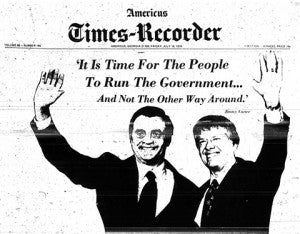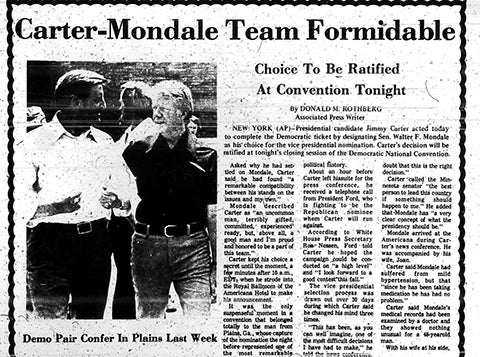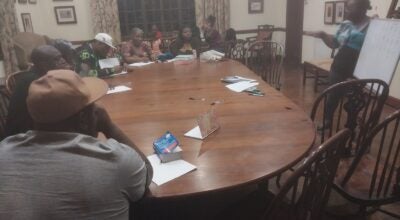Looking back to 1976 Presidential race
Published 1:30 pm Thursday, September 8, 2016
It’s Mondale: Minn. senator Carter’s veep choice
By D. JASON BERGGREN
www.americustimesrecorder.com
On Thursday, July 15, the last day of the Democratic National Convention in New York City, Jimmy Carter announced that he had chosen two-term Minnesota senator Walter F. Mondale to be his vice presidential running mate. In its July 15 edition, the Americus Times-Recorder identified the Carter-Mondale ticket as “formidable”.
After the June 8 primaries, Carter began to give serious attention to his vice-presidential selection. The eventual Democratic nominee and his staff recognized that the vice presidency was an important office. Three recent occupants, Presidents Harry Truman, Lyndon Johnson, and Gerald Ford, assumed the position due to a presidential death or resignation.
Then, there was the resignation of Vice President Spiro Agnew for scandal and the removal of Missouri senator Thomas Eagleton from the 1972 Democratic vice-presidential slot for mental health reasons. Carter wanted to avoid these errors in judgment and assure the public that his vice president was someone who was qualified and had the experience to take command in an emergency.
Carter campaign manager Hamilton Jordan said on NBC’s Meet the Press (June 20) the campaign was vetting “Democratic members of Congress, Democratic governors, [and] mayors of large cities”. They were pouring over each prospect’s biographical information, voting records, appearances in news stories, and medical and financial history. Charles Kirbo, an Atlanta lawyer and Carter confidante, directed the search.
Jordan was subsequently asked if Carter would turn the decision over to the convention delegates as Adlai Stevenson did in 1956. He said that was not going to happen. He explained that Carter “will want to name one man or woman.” Jordan believed that the choice was the prerogative of the party nominee, not the convention. It was his personal choice. “I think the nominee of the party and the potential next President of this country has a right to select someone that is compatible on the issues.”
On Sunday, July 11, the day before the start of the Democratic Convention, Carter appeared on Meet the Press. He confirmed that he had narrowed his vice-presidential list to seven and said that each one was thoroughly vetted. “We have done the most careful possible preparation for a final decision, consulting with distinguished leaders all over the country who are not considered for Vice President, analyzing the voting records and past attitudes of these candidates, and then personal interviews by me.”
The seven finalists were all members of Congress: Mondale, Idaho senator Frank Church, Illinois senator Adlai Stevenson III, Maine senator Edmund Muskie, New Jersey representative Peter Rodino, Ohio senator John Glenn, and Washington senator Henry Jackson.
There were no racial minorities, women, or fellow southerners among the finalists. However, Barbara Jordan, an African-American congresswoman from Texas, and Tom Bradley, an African-American and the mayor of Los Angeles, were under consideration early in the process. In terms of experience, there were no state governors either.
Beginning in early July, Carter held interviews with the vice-presidential finalists. He met with Senator Muskie, Senator Glenn, and Senator Mondale in Plains. During the convention in New York, he met with Senator Jackson, Senator Church, Senator Stevenson, and Congressman Rodino.
In his presidential memoir, Keeping Faith, Carter said that his final two were Mondale and Muskie. He wrote, “It was a difficult decision. Both were good men, experienced legislators, knowledgeable about the nation, popular in their own states, and respected by their colleagues. I was convinced that either would be an excellent President if called upon to serve.”
Indeed, Carter vacillated among his finalists. He told U.S. News and World Report that Mondale was not his initial choice. “I’ve actually changed my mind three times … I have to tell you that Senator Mondale is the fourth one.” It had been reported that before Carter decided on Mondale in the evening of July 14, his previous three choices had been Church, Glenn, and Muskie.
The principal liability Mondale had, according to Carter, was that he abandoned his own presidential effort for the ’76 nomination back in 1974. Newsweek called it the “guts question” and it dominated the question-and-answer session Mondale had with Kirbo.
Carter wondered if the Minnesota senator had the stamina and work ethic to campaign hard. He explained to U.S. News, “It was one of the major doubts that I had about him at the beginning. He was not my original choice.” Carter told Time, “I had a slight feeling that I had worked hard, and he had not.”
On the morning of July 15, Carter announced his choice to be Mondale. He said that he chose him because they were compatible on important issues, and most importantly, he was qualified and capable in his own right to lead the country in a moment’s notice as president. Carter declared that Mondale was “the best person to lead this country if something happened to me.”
As reported by the Americus Times-Recorder, Mondale said, “I’m proud and honored to be a part of this.” In addition, he said he was honored to join the ticket with “a good man”.
In Keeping Faith, Carter explained that he had been particularly impressed by Mondale’s preparedness. When Mondale and his wife, Joan, were invited to Plains as part of the selection process, Carter said he was full of ideas as to how a Carter-Mondale administration could work. He had a vision for transforming the vice presidency into a more useful position in the executive branch.
Mondale made it clear to Carter that he was not interested in the position if he was expected to merely perform a ceremonial role. He did not want to be excluded from the central workings and decision-making of the administration as Hubert Humphrey and Nelson Rockefeller had been as vice president. As he explained in his 2010 memoir, The Good Fight, Mondale said, “I told [Carter] I thought the Humphrey vice presidency had been tragic and that I didn’t want anything like that. I said I understood that I wouldn’t be the president, but that I wanted a significant role in the administration.”
Carter also liked the fact that Mondale was from Elmore, a small town in Minnesota, and was the son of a Methodist minister. Because of his own strong religious faith, Mondale said Carter “was interested to know that I also had a strong religious background.”
There were political reasons for going with Mondale. The Minnesota senator balanced the ticket in terms of geography, political ideology, and type of political experience. Mondale was a northerner from the Midwest, a liberal Democrat, and a Washington insider for the past 12 years as a United States senator.
Time described Mondale as “a cool, skillful legislator and campaigner” who would help Carter with “labor and liberals”. Leonard Woodcock, president of the United Auto Workers, said Mondale was a union favorite. It was also observed in Time that Mondale was “strong with Jewish leaders”. With Mondale, Carter was able to unify his party and assuage parts of the party that remained suspicious of having a moderate-to-conservative, Deep South, religious politician as its standard bearer.
The choice of Mondale was also an overture to the “stop Carter” Democrats, many of whom preferred Hubert Humphrey and had hoped that he would enter the late primaries in May and June. Humphrey was Mondale’s political mentor in Minnesota. Mondale even filled Humphrey’s vacated seat in the U.S. Senate in 1964, when the latter was elected to the vice presidency on a ticket with Lyndon Johnson. Mondale said Humphrey encouraged him to take the vice-presidential position if it was offered.
The 1976 Democratic ticket, however, was not balanced in terms of age or religion. At the time of the convention, Carter was 51 years old and Mondale was 48. The Republican ticket was older. President Gerald Ford was 63 and his running mate, Kansas senator Bob Dole, was 53.
Both were Protestant Christians with Carter a Southern Baptist and Mondale a Presbyterian. Religiously, this contrasted with the Democratic tickets of 1960, 1968, and 1972. In those years, the Democrats ran a ticket with one Protestant and one Catholic. According to U.S. News, Carter acknowledged that his selection of Mondale did not balance the ticket religiously and it did not do much for him in the Western states where he struggled in the primaries against Church and Jerry Brown.
What likely hurt Muskie’s prospects were his two losing national campaigns for president and vice president. He was the vice-presidential candidate on the Democratic Party’s 1968 ticket that lost to Nixon. In 1972, he was the party’s frontrunner for the presidential nomination, but his candidacy flamed out and George McGovern became the nominee.
Mondale’s electoral record, in comparisoh, was unblemished. His first political office was as the Attorney General of Minnesota. The governor appointed him to the post and he was then elected to a full term in 1960. Two years later, in 1962, he won re-election. Mondale then won two terms to the U.S. Senate in 1966 and 1972.
 On July 15, Mondale officially received the Democratic Party nomination for vice president. In his remarks to convention delegates, Mondale offered one of the key reasons why he was excited about running with Carter and why he thought that 1976 was going to be a good year for Democrats. Mondale said that in 1976 the party was united. In particular, he contended, the Democrats nominated a ticket that would overcome and heal the remaining regional divisions in the party and in the country. Unlike the last three elections, with a southerner at the top of the ticket, Mondale believed Democrats would do very well in the South come November.
On July 15, Mondale officially received the Democratic Party nomination for vice president. In his remarks to convention delegates, Mondale offered one of the key reasons why he was excited about running with Carter and why he thought that 1976 was going to be a good year for Democrats. Mondale said that in 1976 the party was united. In particular, he contended, the Democrats nominated a ticket that would overcome and heal the remaining regional divisions in the party and in the country. Unlike the last three elections, with a southerner at the top of the ticket, Mondale believed Democrats would do very well in the South come November.
Mondale said this in his convention address: “For well over a century our Nation has been divided North against South, and South against North. Since the Civil War bitterness, suspicions and doubts have sorely troubled and divided our Nation as well as our Party.
“Perhaps all of us are to blame; certainly all of us have suffered.
“But tonight we stand together as a Party. We stand together as a Nation, reunited at long last, North and South, Georgia and Minnesota – one.
“We are one and we are together with affection and understanding, rejoicing in our new-found and permanent national unity. This year for the first time since 1848 we will elect a new President of our county who is a Southerner and who showed his people and our country how to get together in national unity.”
D. Jason Berggren is an associate professor of political science at Georgia Southwestern State University.





